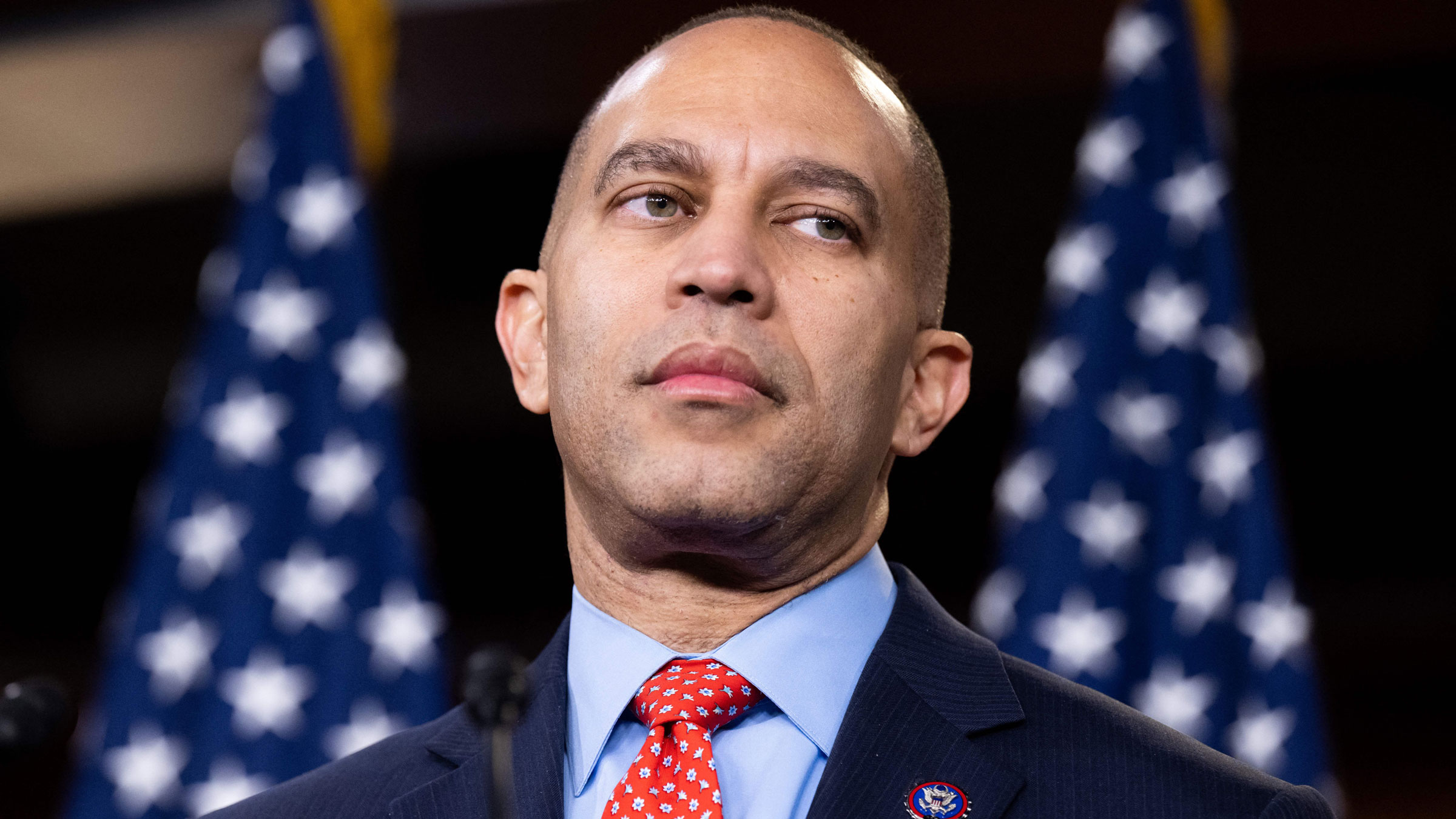Table Of Content
- Support for Israel
- Origin of the post
- Will far-right Republicans seek revenge on Mike Johnson for Ukraine, surveillance votes?
- House Republicans convene to push immigration, environmental policies as Johnson ouster threat stagnates
- Members of Congress ‘saddened’ by the death of New Jersey Rep. Donald Payne Jr.
- House Democratic Leadership News Conference

The Democratic House minority leader Hakeem Jeffries has released a letter to Republican speaker Mike Johnson requesting consideration of a bipartisan bill to counter antisemitism. 15 Robert Dole resigned from the Senate on June 11, 1996, to devote time to his campaign for president. 10 With the 79th Congress, the Republican Conference separated the offices of floor leader and conference chair. In 2022, Jeffries made history as the first Black lawmaker to hold the title of House minority leader. He could make history again as the first Black House speaker if plans of ousting Johnson and striking a compromise with Democrats were to become a reality. Jeffries is the eldest of two sons born to Laneda (Gomes) Jeffries, a social worker, and Marland Jeffries, a substance-abuse counselor.

Support for Israel
Speaker of the House Nancy Pelosi named Jeffries was one of the seven impeachment managers in the January 2020 impeachment of President Donald Trump, who was accused of pressuring Ukraine to investigate his opponent Joe Biden in that year’s presidential election. In his closing argument, Jeffries called Trump “a clear and present danger to our national security,” calling for the former president’s removal from office. Following law school, Jeffries clerked for Judge Harold Baer Jr. of the U.S. Jeffries practiced law for several years at Paul, Weiss, Rifkind, Wharton & Garrison LLP.
Mike Johnson confronts new doubts as House speaker - Reuters
Mike Johnson confronts new doubts as House speaker.
Posted: Wed, 07 Feb 2024 08:00:00 GMT [source]
Origin of the post
They are reckoned as the second most powerful member of their party, behind the minority leader. Five activities illustrate how minority leaders seek to accomplish this primary goal. From a party perspective, the minority leader has a wide range of partisan assignments, all geared toward retaking majority control of the House. In 1989 Speaker Jim Wright of Texas resigned under pressure following revelations about a book deal the House Ethics Committee saw as circumventing fundraising rules. Longworth's successor, John "Cactus Jack" Garner of Texas, left the office after just over a year to be Franklin Roosevelt's first vice president. Prior to that, the last Republican speaker had been Nicholas Longworth of Ohio, who died in 1931.
Will far-right Republicans seek revenge on Mike Johnson for Ukraine, surveillance votes?
In the instance when the Presidency and both Houses of Congress are controlled by one party, the Speaker normally assumes a lower profile and defers to the President. For that situation the House Minority Leader can play the role of a de facto "leader of the opposition", often more so than the Senate Minority Leader, due to the more partisan nature of the House and the greater role of leadership. Minority Leaders who have played prominent roles in opposing the incumbent president have included Gerald Ford, Richard Gephardt, Nancy Pelosi, and John Boehner.
1 Scholars continue to debate which senators served as the first majority and minority leaders, known alternatively as "floor leaders" or "party leaders." The first senators to assume the party leadership role held the position of party conference chair, which dates back to the 1860s and 1870s. Senate Parliamentarian Floyd Riddick contended in an influential 1969 study that the Democratic Conference designated the chair as the "official" party leader in 1921 and that the Republican Conference elected its first "official" leader in 1925. Titles used by party leaders varied well into the 20th century, however, so it is difficult to designate one as more "official" than another. A 2019 Congressional Research Service report identifies Arthur P. Gorman of Maryland as the first Democratic leader in 1893 and Henry Cabot Lodge of Massachusetts as the first Republican leader in 1919. The Senate Historical Office is persuaded by the research of scholars Gerald Gamm and Steven S. Smith, which proposes that conference chairs operated as party leaders even earlier. Gamm and Smith find that Gorman used his position as conference chair to lead Democrats on the floor and that observers considered him to be the party leader beginning in 1890.
California Assembly
16 From January 3 to January 20, 2001, with the Senate divided evenly between the two parties, the Democrats held the majority due to the deciding vote of outgoing Democratic vice president Al Gore. Beginning on January 20, 2001, Republican vice president Richard Cheney held the deciding vote, giving the majority to the Republicans. On May 24, 2001, Senator James Jeffords of Vermont announced his switch from Republican to Independent status, effective June 6, 2001.
House Republicans convene to push immigration, environmental policies as Johnson ouster threat stagnates
After the January 6 attack on the Capitol, McCarthy condemned Trump’s actions but quickly retreated and made amends. McCarthy, 57, has been plotting his path to the speakership for the better part of a decade. The balance of power in Washington will shift when Republicans officially take control of the House on 3 January. Jeffries and Senate Majority Leader Chuck Schumer, also from New York, will lead the Democratic Party in their respective chambers over the next two years as Biden continues to mull over whether he will seek reelection in 2024.
Their departure ushers in a younger generation of Democratic leadership, including the 52-year-old Jeffries. He is joined by 59-year-old Massachusetts Representative Katherine Clark and 43-year-old California Representative Pete Aguilar as whip and chairman of the caucus, respectively. On Thursday, one House Democrat, Matt Cartwright of Pennsylvania, told Bloomberg News Jeffries had been “a phenomenal caucus chair.
Pelosi, from California, was the first woman to be speaker and filled the role from 2007 to 2011 and since 2019. He briefly faced the possibility of a younger challenger, but was ultimately elected unanimously by the caucus. Once considered a relative moderate, the California congressman has steadily moved to the right. He embraced Donald Trump early and remains one of his staunchest defenders on Capitol Hill.
The main function of the majority and minority whips is to gather votes of their respective parties on major issues. The minority leader is often assisted in their role by whips, who work to enforce party discipline on votes deemed to be crucial by the party leadership and to ensure that members do not vote in a way not approved of by the party. In 2006 Jeffries ran successfully for the New York State Assembly and took office the following year. Securing broad support, Jeffries easily won the race to represent New York’s 8th congressional district, which includes parts of Brooklyn and the neighbouring borough of Queens. After taking office in 2013, he took particular interest in police and criminal justice reform. He introduced legislation calling for a federal ban on the police use of choke holds following the death of an unarmed Black man, Eric Garner, in July 2014.
The No. 2 Republican at the time did not have the votes, and the No. 3 declined to run. The chairman of the Appropriations Committee was nominated by the party conference but withdrew after a magazine story accused him of marital infidelity. Johnson is the sixth Republican elevated to the speakership since 1994, the year the party won its first House majority and elected a speaker of its own for the first time in 40 years. The hard truth is that the five who preceded Johnson (McCarthy, Paul Ryan, John Boehner, Dennis Hastert and Newt Gingrich) all saw their time in the office end in relative degrees of defeat or frustration. And to find a Republican speaker who left voluntarily in a moment of victory, moving on to another office, you have to go back to the mid-1920s. Congressional representatives who serve as the majority leader are not subject to term limits.

No comments:
Post a Comment